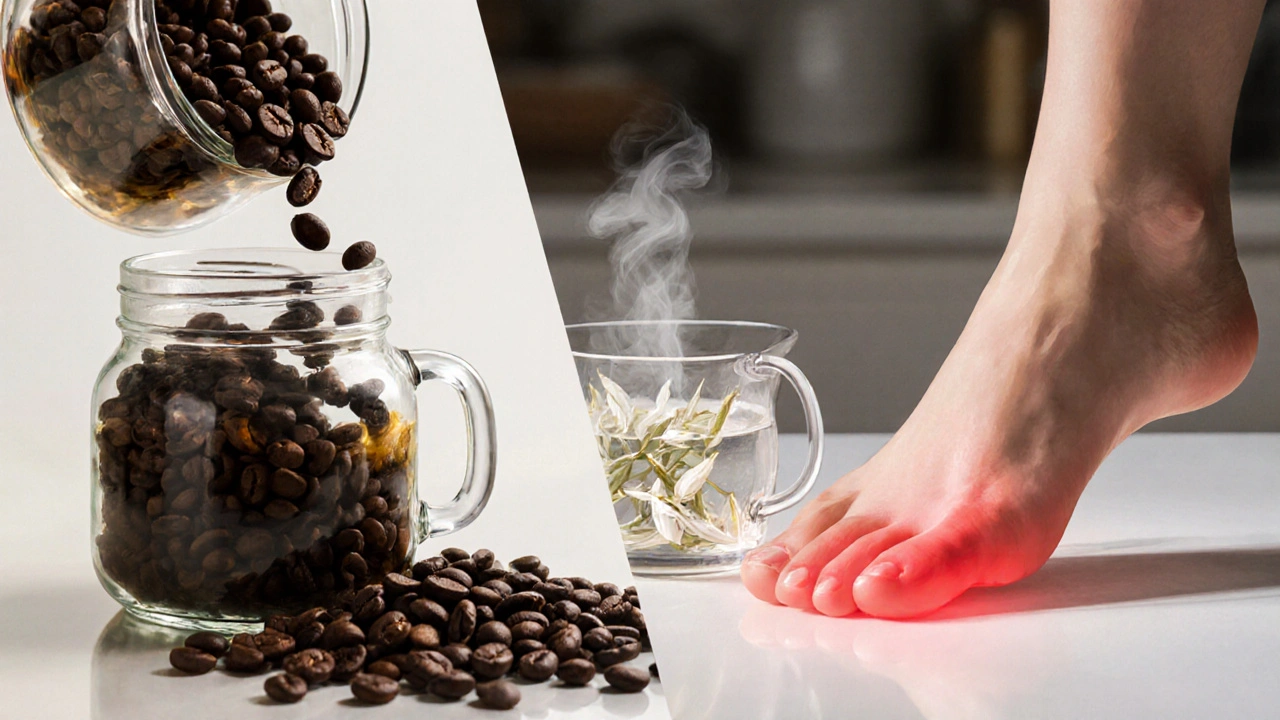Gout is a painful form of arthritis caused by high levels of uric acid crystals in joints. When those crystals flare up, you get sharp, throbbing pain, especially in the big toe. Because diet and lifestyle are the biggest levers you can pull, many wonder whether that daily cup of coffee or tea makes a difference.
Quick Summary
- Moderate coffee (2‑3 cups) may lower uric‑acid levels, potentially easing gout attacks.
- Tea has a milder effect; black tea’s caffeine is similar to coffee, while green tea offers antioxidants that could help.
- Very high caffeine intake (over 400mg per day) can increase dehydration risk, which may trigger flares.
- Overall, enjoy coffee or tea in moderation and stay well‑hydrated.
What Caffeine Actually Does in Your Body
Caffeine is a stimulant found in coffee, tea, and many soft drinks that can affect metabolism and kidney function. It works by blocking adenosine receptors, giving you that alert feeling. But it also nudges the kidneys to excrete more water, which can thin your blood and change how uric acid is filtered.
When you drink caffeine, your body ramps up the production of certain hormones like cortisol. In the short term, this can raise blood uric‑acid concentrations, but the longer‑term picture is more nuanced. Large epidemiological studies have linked regular coffee consumption with lower gout risk, suggesting a net benefit for most people.
Coffee vs. Tea: Similarities and Differences
Coffee is a brewed beverage made from roasted coffee beans, typically containing 95‑200mg of caffeine per 8‑oz cup. It also packs chlorogenic acids, which have antioxidant properties and may improve insulin sensitivity - both factors that indirectly influence uric‑acid metabolism.
Tea is a leaf infusion that can be black, green, oolong, or herbal, usually delivering 30‑70mg of caffeine per 8‑oz cup. Green tea, in particular, contains catechins like EGCG, which have been shown to reduce oxidative stress and may help lower uric‑acid levels.
Both drinks deliver caffeine, but coffee generally provides more per serving. That extra caffeine can be a double‑edged sword: enough to trigger a modest diuretic effect, yet not so much that it overwhelms the body if you stick to two or three cups.
Uric Acid, Purines, and Inflammation: The Science Behind Gout
Uric Acid is a waste product formed when the body breaks down purines, which are found in many foods and also produced internally. When the kidneys can’t clear it fast enough, it crystallises in joints, causing the classic gout flare.
Purines are nitrogen‑rich compounds present in meat, seafood, some legumes, and even certain vegetables like spinach. High‑purine diets raise uric‑acid production, so many gout‑management plans start by cutting red meat and shellfish.
Inflammation, the body’s natural response to these crystals, drives the intense pain. While caffeine itself has mild anti‑inflammatory properties (it can inhibit NF‑κB signaling), the primary benefit comes from keeping uric‑acid levels low and staying hydrated.

Practical Guide: How to Use Coffee and Tea Safely with Gout
- Stick to 2‑3 cups of coffee daily. That amount has been associated with a 10‑15% lower gout risk in large cohort studies.
- Prefer brewed coffee over instant or flavored varieties that add sugar and extra calories.
- If you love tea, aim for 3‑4 cups of green or black tea. The antioxidants boost overall joint health.
- Never substitute coffee or tea for water. Aim for at least 2‑2.5L of plain fluids each day.
- Watch caffeine timing. Consuming it late in the day can disturb sleep, which indirectly raises cortisol and uric‑acid levels.
- If you’re on gout medication like Allopurinol (a xanthine oxidase inhibitor that reduces uric‑acid production), talk to your doctor about how much caffeine is safe for you.
Remember, the goal isn’t to cut out coffee or tea entirely but to use them as part of a balanced regimen that includes low‑purine foods, adequate hydration, and regular exercise.
Side‑by‑Side: Coffee, Tea, and Water
| Drink | Caffeine (mg per 8oz) | Effect on Uric Acid | Recommended Daily Limit |
|---|---|---|---|
| Coffee (brewed) | 95‑200 | Often lowers uric‑acid levels; antioxidant‑rich | 2‑3 cups |
| Tea (black/green) | 30‑70 | Neutral to slightly lowering; catechins add anti‑oxidant benefit | 3‑4 cups |
| Water (plain) | 0 | Helps flush uric acid; essential for preventing flares | 2‑2.5L (≈8‑10 cups) |
Common Pitfalls and How to Avoid Them
- Over‑caffeinating. More than 400mg (about 4 cups of coffee) can increase dehydration risk, especially if you’re not drinking enough water.
- Adding sugar or cream. Those extra calories can lead to weight gain, which is a known gout risk factor.
- Skipping hydration. Even a modest caffeine dose can act as a diuretic; counter it with extra water.
- Ignoring medication interactions. Some gout drugs affect kidney function, so sudden spikes in caffeine may alter how your body processes the medication.
Next Steps: Tailoring Your Gout‑Friendly Beverage Plan
Start a simple log for one week: note each coffee or tea cup, the time of day, and any gout symptoms you notice. Pair that with a water‑intake tracker. If you see a pattern-say, flares after late‑night coffee-adjust accordingly.
Combine your beverage plan with a low‑purine diet: lean proteins, low‑fat dairy, cherries, and plenty of vegetables. Regular gentle exercise (like walking) also helps keep uric‑acid levels steady.
Finally, schedule a check‑in with your rheumatologist or primary‑care doctor. They can run a serum uric‑acid test and fine‑tune any medication dosage based on how your caffeine habits are affecting you.

Frequently Asked Questions
Can coffee cure gout?
No. Coffee can lower uric‑acid levels moderately, but it’s not a cure. Effective gout management still requires diet control, hydration, and often medication.
Is green tea better than black tea for gout?
Green tea offers extra catechins that have anti‑oxidant effects, which may give it a slight edge. However, both black and green tea are acceptable in moderate amounts.
How much caffeine is safe if I’m on allopurinol?
Most doctors consider up to 300mg per day (about 2‑3 cups of coffee) safe, but you should confirm with your prescriber because individual kidney function varies.
Does caffeine increase uric‑acid spikes?
Short‑term spikes can happen, especially after a large caffeine dose, but regular moderate intake has been linked to lower overall uric‑acid levels in population studies.
Should I replace alcohol with coffee to improve gout?
Replacing high‑purine alcoholic drinks (beer, spirits) with coffee can reduce gout risk, but remember to keep water intake high to offset coffee’s diuretic effect.


Comments (14)
cris wasala
Great rundown on coffee and tea for gout folks keep it simple and stay hydrated you’ll see the benefits over time.
Tyler Johnson
I appreciate the thoroughness of the article and would like to add that while caffeine does have a diuretic effect it is not the sole driver of dehydration especially when balanced with adequate water intake and mindful timing of consumption throughout the day it is also worth noting that individual tolerance to caffeine varies widely due to genetic factors and existing medical conditions such as hypertension or chronic kidney disease which can modulate how uric acid is processed and excreted therefore a personalized approach, perhaps guided by a healthcare professional, remains the gold standard for managing gout alongside these beverage choices.
Annie Thompson
Reading through the data I can’t help but feel a pang of dread because the reality of gout is that it rarely respects the simplistic advice you get on forums. First, caffeine’s impact on uric acid is not a binary switch; it oscillates depending on dosage, timing, and your baseline kidney function. Second, the antioxidants in green tea are indeed promising but they coexist with tannins that may impede iron absorption, a concern for anyone already battling anemia. Third, the diuretic nature of coffee can paradoxically raise uric acid concentrations if you don’t replace the lost fluids with pure water, leading to a vicious cycle of dehydration and flare‑ups. Fourth, many studies reference population averages which hide outliers-people who are hyper‑sensitive to even modest caffeine amounts and experience spikes after a single espresso. Fifth, the interaction with allopurinol is subtle; caffeine can affect drug metabolism pathways, potentially requiring dose adjustments. Sixth, let’s not ignore the role of sugar and cream, often added to coffee, which contribute extra calories and can promote weight gain, a known risk factor for gout. Seventh, lifestyle stressors such as poor sleep amplify cortisol production, which in turn can raise serum uric acid, making late‑night caffeine a double‑edged sword. Eighth, the purine content of coffee beans is actually negligible, yet the brewing method (e.g., Turkish coffee) may introduce additional compounds that influence renal clearance. Ninth, you should monitor urine output – a clear indicator that your kidneys are handling the caffeine load properly. Tenth, an anecdotal but consistent observation among my patients is that switching from coffee to tea reduces the frequency of nocturnal attacks. Eleventh, the catechins in green tea also have anti‑inflammatory properties that may soothe joint inflammation beyond just uric‑acid reduction. Twelfth, variability in individual gut microbiota can modulate how polyphenols are metabolized, further complicating the picture. Thirteenth, remember that hydration is the cornerstone; a minimum of 2‑2.5 L of water daily is non‑negotiable regardless of caffeine intake. Fourteenth, keep a simple log of beverage type, timing, and any gout symptoms to spot personal patterns. Fifteenth, always discuss any substantial changes with your rheumatologist because what works for the majority may not be optimal for you.
Parth Gohil
From a nephrology standpoint the caffeine‑induced natriuresis can mildly enhance uric‑acid clearance but only when coupled with adequate fluid replacement; think of it as a double‑edged sword where the blade is blunt if you’re sipping plain H₂O alongside your espresso.
VAISHAKH Chandran
Coffee is elite only for the privileged palate.
Pat Merrill
Oh wow another ‘expert’ telling us to drink more coffee – as if we don’t already have enough caffeine‑induced heart palpitations to juggle with our gout flare‑ups. Guess the universe loves irony.
Vicki Roth
I hear you but i’d just keep it simple drink water first and then enjoy a cup of tea if you feel like it.
Vishal Bhosale
Honestly the article over‑promises the benefits of caffeine and under‑states the risk of dehydration – just another hype piece.
Garima Gauttam
But what if the real issue isn’t caffeine at all but the social ritual that encourages over‑consumption in the first place.
Georgia Nightingale
Hold up! This is the plot twist no one saw coming – the ‘moderate coffee’ recommendation is secretly a covert marketing ploy by the caffeine cartel to keep us hooked while they sell us premium beans that cost more than my rent. Yet, with the right balance you can actually turn the tables, using coffee as a strategic tool to manipulate uric‑acid pathways while still maintaining artistic flair in your diet. So, grab that espresso, but remember the drama is in the details.
Chris Kivel
Thanks for the balanced take – I’ll definitely keep a water‑to‑coffee ratio in mind and stay friendly with my kidneys.
sonia sodano
Sure, but let’s not forget that in many cultures tea is a ceremonial practice that actually reduces stress, which in turn can lower cortisol‑driven uric‑acid spikes – a perspective often ignored by Western health narratives.
Praveen Kumar BK
While I appreciate the enthusiasm, it is morally negligent to recommend caffeine without emphasizing that individuals with compromised renal function may experience accelerated uric‑acid accumulation; proper medical guidance is essential.
Viji Sulochana
yeah thats true im just gonna keep drinking my tea and water cause thats what works for me.